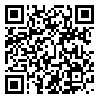

Volume 13, Issue 3 (12-2015)
RBS 2015, 13(3): 409-419 |
Back to browse issues page
Download citation:
BibTeX | RIS | EndNote | Medlars | ProCite | Reference Manager | RefWorks
Send citation to:



BibTeX | RIS | EndNote | Medlars | ProCite | Reference Manager | RefWorks
Send citation to:
اسماعيلي م, بصيري ن, شکيبايي ف. The Effect of Cognitive Behavioral Therapy focused in Insomnia (CBTFI) on Improving Sleep Quality and Insomnia Severity in Patients with Primary Insomnia Disorder. RBS 2015; 13 (3) :409-419
URL: http://rbs.mui.ac.ir/article-1-415-en.html
URL: http://rbs.mui.ac.ir/article-1-415-en.html
1- استاديار گروه روانشناسي دانشگاه اصفهان، دانشگاه اصفهان، اصفهان، ايران
2- کارشناس ارشد روانشناسی بالینی دانشگاه اصفهان، اصفهان، ایران
3- دانشیار گروه روانپزشکی دانشگاه علوم پزشکی اصفهان، اصفهان، ایران
2- کارشناس ارشد روانشناسی بالینی دانشگاه اصفهان، اصفهان، ایران
3- دانشیار گروه روانپزشکی دانشگاه علوم پزشکی اصفهان، اصفهان، ایران
Abstract: (3549 Views)
Abstract Aim and Background: Insomnia disorder is a common sleep disorder in which one is unable in sleep onset or its maintenance or continuity. So Current work aims to investigate cognitive behavioral therapy on insomnia disorder treatment. Methods and Materials: Through random sampling 20 individuals with insomnia disorder selected among patients who referred to psychiatrists with complaints of insomnia symptoms in Isfahan, Iran. Farsi versions of Peterborough sleep quality index (PSQI) (Pittsburg Sleep Quality Index) and insomnia severity index (ISI) were used to assess sleep quality and insomnia severity as primary and secondary outcomes after a course of 9 weeks cognitive behavioral therapy. Statistical package for social sciences (SPSS) version 18 was used for analyzing the data .Covariance analysis was used in this work. Findings: Analysis of covariance showed that cognitive behavioral therapy is effective by 65.7 percent in reduction of ISI tests scores and by 84.7 percent in improvement of sleep quality in PSQI questionnaire, and this which is significantly due to effect of group membership in case group. Participants reported improvement of duration and sleep.They also reported more freshness at morning, less distress about and better coping with insomnia. Conclusions: Assuming that one’s automatic thoughts influence insomnia, this disorder can be treated by changing these thoughts and cognitive behavioral therapy was effective in this regards. Further studies are warranted to investigate the efficacy of CBTFI on other formats of sleep disorders.
Keywords: Insomnia Disorders, Cognitive Behavioral Therapy, Sleep Quality, Insomnia Severity &, nbsp
| Rights and permissions | |
 |
This work is licensed under a Creative Commons Attribution-NonCommercial 4.0 International License. |



